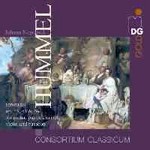
Hummel: Grande Serenade / Potpourri / Grand Serenade
 $32.00
Out of Stock
$32.00
Out of Stock6+ weeks add to cart
JOHANN NEPOMUK HUMMEL
Hummel: Grande Serenade / Potpourri / Grand Serenade
Consortium Classicum
[ MDG / CD ]
Release Date: Sunday 20 May 2007
This item is currently out of stock. It may take 6 or more weeks to obtain from when you place your order as this is a specialist product.
JOHANN NEPOMUK HUMMEL was born in Bratislava in 1778 and died in Weimar in 1837. A child prodigy and pupil of Mozart for two years, he became one of the most brilliant virtuoso pianist-composers of the following generation.
A dazzling performer, Hummel was regarded by Chopin - whose style he influenced - as the equal of Mozart and Beethoven. He was especially famous as an improviser. Schubert wished to dedicate his last three sonatas to Hummel whose music links the classical and romantic periods.
Besides the well-known Trumpet Concerto and Septet in D Minor, more of Hummel's music is currently enjoying a long-overdue revival. His little-known piano concertos - nine in all including the double concerto for piano and violin - are now attracting the attention they deserve. Recordings of these by Stephen Hough and Howard Shelley (Chandos) reveal to the modern listener the combination of brilliance and beauty that made them once so popular. Hough's recent recording of Hummel's F sharp minor Sonata (Hyperion) is undoubtedly an event of considerable musical importance. The seven piano trios played by the Trio Parnassus well repay renewed attention, especially the Opus 83 (Dabringhaus und Grimm).
If Hummel's keyboard skills are very evident in the A minor and B minor Concertos, and the F sharp minor Sonata (described by Schumann as 'an epic, titanic work'), his choral accomplishments are of no mean order. The five symphonic Masses date from 1804 when Hummel succeeded Haydn at the Esterhazy court. Owing much to Mozart and Haydn, Hummel remains his own man. His part writing reveals a rare poetic sensitivity and his stylistic individuality is soon apparent. His lyricism anticipates the melodic flow of Schubert. Currently being rescued from unjust oblivion, his refreshing works deserve a more prominent place in the classical repertoire.
Tracks:
1. Grande Serenade op. 66 - en Potpourri la Piano-Forte, Violon, Guitarre, Clarinette et Basson C major/ut majeur/C-Dur
2. Potpourri op. 53 - pour Piano-Forte et Guitare G major/sol majeur/G-Dur
3. Grande Serenade op. 63 - en Potpourri pour la Piano-Forte, Violon, Guitarre, Clarinette et Basson G major/sol majeur/G-Dur



